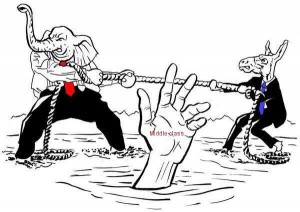January 25, 2019
The ripple effect of the government shutdown has spread far and wide, and the longer it continues the worse it will get, particularly for ordinary people. The poor and aged are at risk of losing their all-important housing benefits that keep them from becoming homeless, all because the federal agencies tasked with funding those vital programs, including Section 8, are either closed or understaffed. Federal employees currently working without pay cannot continue to do so indefinitely. At some point they’ll have to quit which will force the government, if and when it reopens, to train new employees, if there’s anyone left to do so, at great cost; not just in monetary terms but in the public’s perception of what the “full faith and credit” of the government truly means.
It’s also negatively impacting real estate -a critical part of the economy- already reeling from higher interest rates. While Fannie Mae and Freddie Mac continue to operate normally, the economic uncertainty stemming from the shutdown has resulted in a reduction in loan volume. The slower pace of tax return verifications by the IRS is delaying lenders’ ability to originate loans, which in turn, is reducing the volume of mortgages to Fannie and Freddie. The Federal Housing Administration is not endorsing reverse mortgages and Title 1 loans, and it’s not making any new commitments in the Multi-family Program during the shutdown. Single family loan processing through the U.S. Department of Agriculture Rural Housing Service has come to a halt, and the Small Business Administration (SBA) is closed, all lending halted.
The Thirteenth Amendment to the United States Constitution, passed by the Senate on April 8, 1864 and by the House of Representatives on January 31, 1865, abolished involuntary servitude (and slavery) except as punishment for a crime. Involuntary servitude is a United States legal and constitutional term that describes a person laboring against his/her will to benefit another under some form of coercion other than the worker’s financial needs. Accordingly, federal employees forced to work without pay indefinitely on pain of destitution looks, feels, smells, and might even be, a textbook example of involuntary servitude under coercion. If so, at a minimum, this abomination would also be blatantly unconstitutional.
This situation cries out for a (courageous) emergency ruling by the full U.S. Supreme Court, if only someone with legal standing might request it. Mere words cannot adequately convey the urgent need for its intervention to prevent current or future politicians and corporations from weaponizing the livelihood of innocent employees and their families, federal or not, to impose their will. If they’re unwilling or unable, or both, to work with each other like they’re supposed to, then perhaps they should resign –en masse if necessary. After all, no one is irreplaceable.
